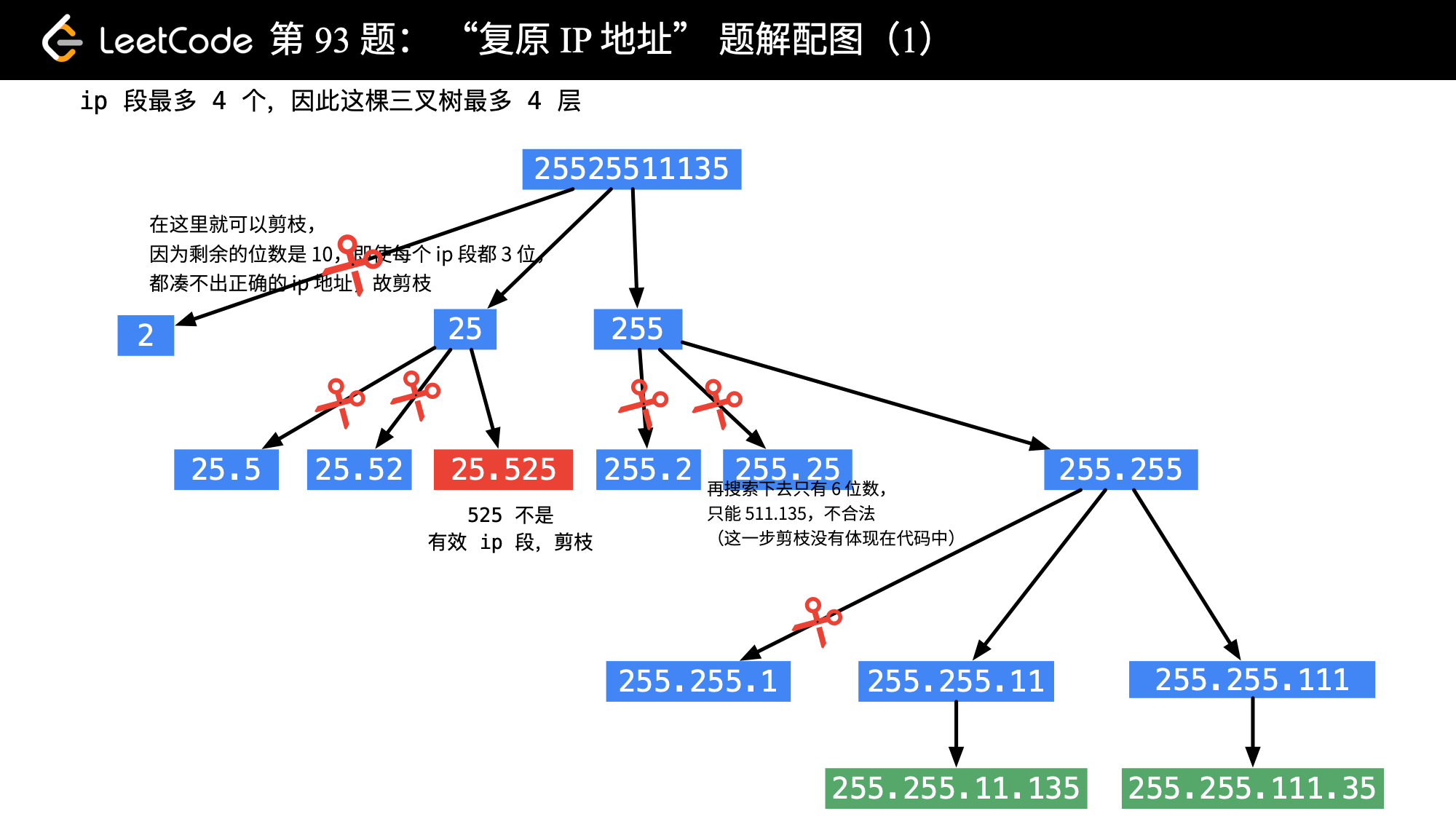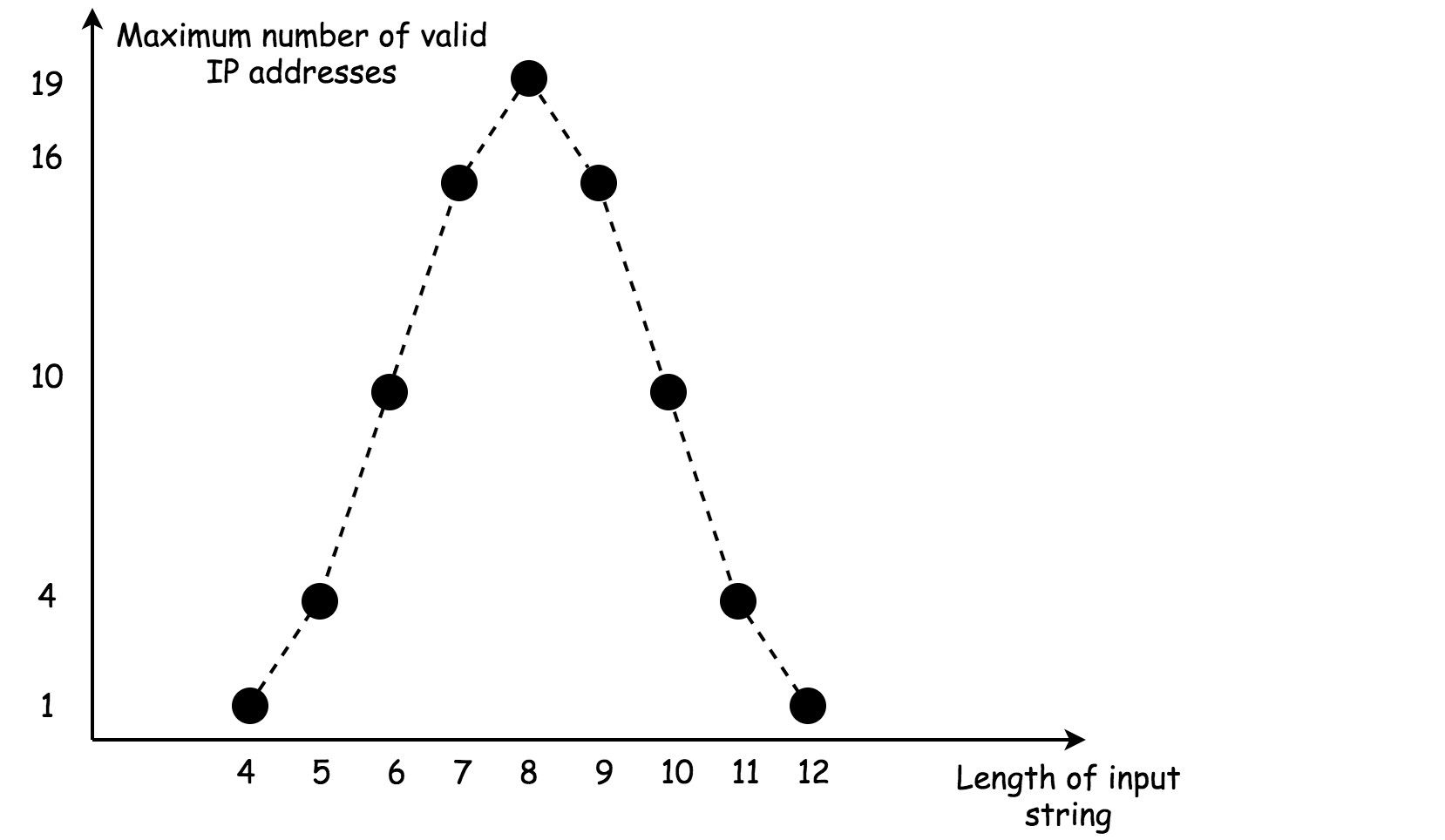这个题要一个字符一个字符的截取,所以关键是要想清楚有哪些剪枝条件,以用来缩小解空间。
题目
给定一个只包含数字的字符串,复原它并返回所有可能的 IP 地址格式。
示例
示例: 输入: "25525511135" "255.255.11.135" , "255.255.111.35" ]
考察知识点
回溯算法
核心思想
方法一、回溯算法直觉 XXX.XXX.XXX.XXX 形式表现,每组 XXX 代表小于或等于255的10进制数。
剪枝 由以上条件可知,我们有以下几种需要剪枝的情况if len(clip_s) > 3: break 2. 前方法截取字符串之后,剩余的字符个数不能过多,例如还有三个ip段需要确定,最多需要 \(3 \times 3\) 也就是9个字符,但是按照当前方法截取之后还剩10个字符,就可以剪枝了(当确定最后一个ip段时,可以不考虑这个剪枝条件)。if depth !=3 and len(s[i:]) > (4 - depth - 1) * 3: continue 3. 截取出来的字符如果是三位数字且大于255,也需要剪枝。if len(clip_s) == 3 and int(clip_s) > 255: continue00, 01, 001, 011, 000 等都是不合法的。len(clip_s) > 1 and clip_s[0] == "0": continuei自增,继续截取,直到截取完所有剩余字符之后再判断是否添加。if depth == 3 and clip_s != s: continue
b581bdde1cef982f0af3182af17fc3c41960c76a7445af0dcfd445c89b4c2eaa-「力扣」第 93 题:复原 IP 地址-1.png
Python版本
1 2 3 4 5 6 7 8 9 10 11 12 13 14 15 16 17 18 19 20 21 22 23 24 25 26 27 28 29 30 31 32 33 34 35 36 37 38 39 40 41 42 43 44 45 46 47 48 49 50 51 52 53 54 55 56 57 58 59 60 61 62 63 64 65 66 67 68 69 70 71 72 73 74 75 76 class Solution :def restoreIpAddresses (self, s: str ) -> List[str]:def backtrack (s, path = [], depth = 0 ):if depth == 4 :"." .join(path))return for i in range (1 , len (s)+1 ):if len (clip_s) > 3 : break if depth == 3 and clip_s != s:continue if depth !=3 and len (s[i:]) > (4 - depth - 1 ) * 3 : continue if int (clip_s) > 255 :continue if len (clip_s) > 1 and clip_s[0 ] == "0" :continue 1 ) return resclass Solution :def backtrack (self, s = "" , path = [], depth = 0 , res = [] ):if depth == 4 :"." .join(path))else :for i in range (1 , len (s)+1 ):if pruning_result == 0 :break if pruning_result == -1 :continue 1 , res) def pruning (self, clip_s, s, i, depth ):if len (clip_s) > 3 : return 0 if depth == 3 and clip_s != s: return -1 if depth !=3 and len (s[i:]) > (4 - depth - 1 ) * 3 : return -1 if int (clip_s) > 255 : return -1 if len (clip_s) > 1 and clip_s[0 ] == "0" : return -1 return 1 def restoreIpAddresses (self, s: str ) -> List[str]:len (s)if size < 4 or size > 12 :return []0 , res)return res"25525511135" ]"255.255.11.135" , "255.255.111.35" ]]if __name__ == "__main__" :for i in range (len (Input)): "-" *50 )
liweiwei1419大佬的版本,更加简洁
1 2 3 4 5 6 7 8 9 10 11 12 13 14 15 16 17 18 19 20 21 22 23 24 25 26 27 28 29 30 31 32 33 34 35 36 37 38 class Solution :def restoreIpAddresses (self, s: str ) -> List[str]:len (s)if size < 4 or size > 12 :return []0 , 0 , path, res)return resdef __dfs (self, s, size, split_times, begin, path, res ):if begin == size:if split_times == 4 :'.' .join(path))return if size - begin < (4 - split_times) or size - begin > 3 * (4 - split_times):return for i in range (3 ):if begin + i >= size:break if ip_segment != -1 :str (ip_segment))1 , begin + i + 1 , path, res)def __judge_if_ip_segment (self, s, left, right ):1 if size > 1 and s[left] == '0' :return -1 0 for i in range (left, right + 1 ):10 + ord (s[i]) - ord ('0' )if res > 255 :return - 1 return res
时间复杂度 : 如上文所述,需要检查的组合不多于27个。19 个有效IP地址。
3baa385fecae6239495c19c88a279f4b76752a7a089fabdf15685e829b8e0a73-image.png
有效语法糖
1、Python中字符串、list的截取位置的起止关系。i 位开始往后面截取,那么第 i 位是不包含在截取结果中的。1 2 3 4 5 6 7 8 9 10 11 12 13 14 15 16 17 18 19 >>> a = '25525511135' >>> b = list ('25525511135' )>>> a'25525511135' >>> b'2' , '5' , '5' , '2' , '5' , '5' , '1' , '1' , '1' , '3' , '5' ]>>> i = 1 >>> a[i:]'5525511135' >>> b[i:]'5' , '5' , '2' , '5' , '5' , '1' , '1' , '1' , '3' , '5' ]>>> len (a)11 >>> len (b)11 >>> len (a[i:])10 >>> len (b[i:])10
参考链接
liweiwei1419题解 LeetCode官方题解

